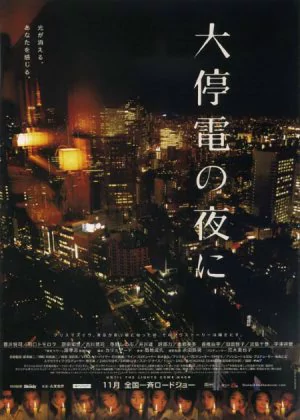Until the Lights Come Back
Takashi Minamoto is a one hit wonder, plain and simple. With Until the Lights Come Back [Daiteiden no Yoru Ni] he managed to hit the mark, but his subsequent films failed to impress, ultimately degrading him to do television work. But at least he did make one great film in his career. While spring probably isn't the best season to watch this one (it's a true Christmas film at heart), a second viewing did little to take away from my initial impressions.

Until the Lights Come Back feels like a Japanese spin on PT Anderson's Magnolia, with added Christmas whistles. Not the typical jingly bells stuff that reeks of sentimentality, instead the warm glow, the snow flakes and the overall upbeat and cosy feeling that make for a perfect Christmas companion. The story start with a bunch of small threads (and there are quite a few) that converge together near the end of the film. While drama isn't shunned, it's handled in a very typical, comforting and down-to-earth (Japanese) way.
The start of the film is a tad slow as Minamoto needs to introduce his entire cast through several short sequences. I think there's close to 10-12 main characters here, all with their own background stories and sorrows, so it takes a while to get through the first 30 minutes. Even at the very beginning some connections are hinted at, but you're bound to miss some of those on your first viewing, simply because you lack familiarity with the different characters.
The film is set during Christmas Eve. After a piece of satellite hits a nearby power station the entire Tokyo area is experiencing a power blackout. People make do with what they've got as they start to loiter around the city, looking for some companionship. Central to the story is a jazz café that functions as a meeting place for the characters and their intertwining stories, though it's definitely not a "one set" type of film.

A big part of the film's appeal lies in its romantic setting. The candle-lit café, looks absolutely amazing, the narrow alley where it's situated almost fairytale-like. Visually Until the Lights Come Back is a wonderful film, somewhat slick and polished in places, but shot with a great feel for lighting, color and framing. Cinematographer Tetsuo Nagata did a splendid job, which isn't too surprising when looking at the rest of his resumé (Blueberry, Splice, Micmacs).
The music too is an asset for the film. It's a bit atypical to go for a jazzy soundtrack when making a Christmas film, but it works wonders for the atmosphere. I'm not a big jazz fan and seen separately from the film the score would never appeal to me, but considering the setting and the mood it's a perfect fit. It gives the film some extra warmth and glow and erases some of the mushiness that usually comes with the territory.
While the cast has a few weaker entries, Minamoto did enjoy the company of some of Japan's better actors. Tomorowo Taguchi is always great to have around, Shinobu Terajima is probably the best female actor in Japan nowadays. Ken Utsui, Koji Kikkawa and Etsushi Toyokawa are also on a role here, ensuring the core cast is up to par. Some of the secondary roles are a little weaker (Haruka Igawa), but they never bog the film down.

Throughout the night the connections between the various characters become clearer as people meet up and hidden background stories are revealed. With this kind of setup it always feels as if there's a little too much coincidence at play, then again, once you get the whole picture it's just a pretty smart breakdown of the drama and the people involved. Minamoto holds a firm grip on the story, never letting it become too far-fetched, never letting the drama get too sappy.
Somehow Until the Lights Come Back never found its way into the mainstream, even though it's a pretty accessible film. It's sweet, upbeat, feel good, a tad long maybe but never slow or boring. It's a shame Minamoto wasn't able to repeat his success, then again Until the Lights Come Back is a great film and sometimes that's just enough. This film is probably best seen during the holiday season, but it holds enough qualities regardless of when you decide to watch it.
